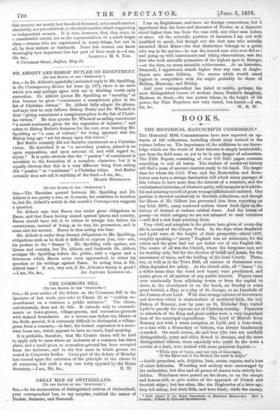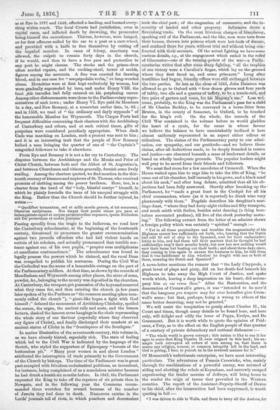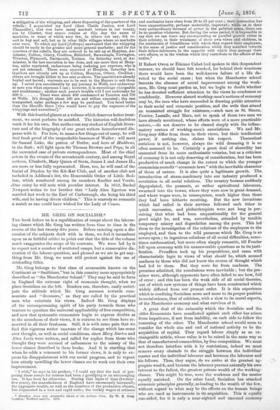BOOKS.
THE HISTORICAL MANUSCRIPTS COMMISSION.* THE Historical MSS. Commissioners have now reported on up- wards of 420 collections, including about sixty noticed in the volume before us. The importance of the additions to our know- ledge which are the result of their labours is simply incalculable, nor does the field seem as yet to be in any danger of exhaustion. The Fifth Report, consisting of over 600 folio pages, contains something to suit all tastes. The student of medifeval history will find a mass of ancient charters ready to his hand. The larger class for whom the Civil Wars and the Restoration and Revo- lution eras have a strange fascination will admit many passages of this volume to have more than the interest of a romance, and the ecclesiastical historian, of whatever party, will recognise in it a faith- ful and sobering record of great wrongs inflicted and endured. One portion is devoted exclusively to Scottish collections, and though the illness of Mr. Gilbert has prevented him from reporting on any Irish MSS., many scattered notices throw fresh light on the history of Ireland at various critical times. And the lovers of gossip—in which category we are not ashamed to rank ourselves —will find a rich feast awaiting them.
Very vivid and complete is the picture here given of every-day life in several of the Cinque Ports. In the days when Sandwich and Lydd were at the height of their prosperity—about 1400, roughly speaking—" merry" England was no misnomer, for the colour and the glow had not yet faded out of our English life. The centre of all was the Church, where the burgesses met, not for worship only, but for the election of bailiff and jurats, for the assessment of taxes, and the holding of the local Courts. There, too, as well as in the Town Hall, all manner of documents were often deposited for safety. At the church stile, all " banns " (in a wider sense than the word now bears) were proclaimed, and notice given of all matters of any public interest. Players came over continually from adjoining towns or from the capital to show, in the churchyard or on the beach, on Sunday or some great festival, a May, or a play of St. George, or an Interlude of the Passion of our Lord. With that strange mixture of irreverence and devotion which is characteristic of mediaaval faith, the boy Bishop of Romney, year by year, on St. Nicholas' Day, visited Lydd to parody the supreme act of Christian worship. Payments to minstrels of the King and great nobles were a very important item of the municipal expenditure. The Lord of Misrule from Romney met with a warm reception at Lydd, and a bear-ward, or a man with a dromedary or baboon, was always handsomely rewarded. On small excuse, ale and beer (the two are carefully distinguished), perry and cider, flowed in streams, and the more distinguished visitors, those especially who could do the town a service or a hurt, were treated with more generous liquors : —
"White wyn of Oseye, and red wyn of Gascoigne, Of the Ryne and of the Roche], the roste to dap," —beside porpoises, eels, dolphins, bass, swans, capons, and a host of other delicacies. Wrestling and archery were encouraged by the authorities, but dice and all games of chance were strictly for- bidden. Watchmen were posted on the shore, or on the steeple and beacon-hill, to give notice of the approach of French and Scottish ships ; but too often, like the Dogberries of a later age, they fell asleep, lost their bills, and were fined; while the enemy, • Fifth Report of the Royal Commission on siatorkat litanuscripu. Part L London : Printed by Eyre and Spottlawoode.
as at Rye in 1377 and 1448, effected a landing, and burned every- thing within reach. The local Courts had jurisdiction, even in capital cases, and inflicted death by drowning, the prosecutor being himself the executioner. Thieves, however, were hanged, or for first offences nailed by the ear to a post or a cart-wheel, and provided with a knife to free themselves by cutting off the impaled member. In cases of felony, sanctuary was
allowed, the culprit to remain forty days in the church, if he would, and then to have a free pass and protection to any port he might choose. The stocks and the prison-door often needed repairs, and the cucking-stool, terror of scoldi3, figures among the accounts. A fine was exacted for drawing blood, and in one case for " sesquipedalia verbs," or long-worded abuse. Hostelries were at first kept exclusively by women, but were gradually superseded by inns, and- under Henry VIII. the bona fide traveller had fully entered on bin perplexing career. Among other disbursements were those to the Parliamentary repre- sentatives of each town ; under Henry VI. Rye paid its Members 1s. a day, and New Romney, at a somewhat earlier date, 1s. 8d. ; and in 1558, we read of "the ordinary and dayly stypends " of the honourable Member for Weymouth. The Cinque Ports had frequent difficulties concerning their charters with the Archbishop of Canterbury and others, and at such critical times, gifts of
porpoises were considered peculiarly appropriate. When Jack Cade was marching on London, such a present was sent to him ; and it is an interesting trait that the people of New Romney bribed a man bringing the quarter of one of "the Captain's" misguided followers to take it elsewhere.
From Rye and Romney it is not a far cry to Canterbury. The disputes between the Archbishops and the Monks and Prior of Christ Church, between both and the Abbot of St. Augustine's, and between Churchmen and citizens generally, furnish some lively reading. Among the charters quoted, we find mention in the thir- teenth century of kinsmen and nephews of St. Thomas, who received presents of clothing among the poorer brethren. Here, too, is a charter from the hand of the' "holy, blissful martyr" himself, in which he plainly foretells the issue of his unequal struggle with the King. Rather than the Church should be further injured, he writes :—
" Quodlibet tormentum, Bed et mine mortis genera, si tot occurrent, libenchu3 exeipiemus. Nos itaque lieet parati simus pro pace et indempnitate capud et corpus persecutoribus exponere, ipsam Eeclesiam sub Del protections et nostra ponimus."
Passing speedily from the tragic to the ludicrous, we read how the Canterbury schoolmaster, at the beginning of the fourteenth century, threatened to pronounce the greater excommunication against two juvenile offenders who had laid violent hands on certain of his scholars, and actually pronounced that terrible sen- tence against one of Ms own pupils, " propter sua.s multiplicatas et manifestas contumaciones." The schoolmaster was found to legally possess the powers which he claimed, and the rural Dean was compelled to publish his sentences. During the Civil War the Cathedral was the scene of a lamentable outrage on the part of the Parliamentary soldiers. At that time, as shown by the records of Mendlesham and Weymouth among other places, the store of arms, powder, &c., belonging to the county was deposited in the churches.
At Canterbury, the troopers got possession of the keys and removed what they came for, and then entering the church (a few years later spoken of by the Puritans as "the common meeting-place com- monly called the church "), "giant-like began a fight with God himself ;" defaced the monument of Archbishop Chicheley, spoiled the screen, the organ, the ancient rails and seats, and the brazen lectern, slashed the famous arras hangings in the choir representing the whole story of our Saviour (especially where they observed any figure of Christ), and finally discharged their muskets at an ancient statue of Christ in the "frontispiece of the Southgate."
In matter illustrative of the seventeenth century, this volume is, as we have already hinted, especially rich. The state of feeling which led to the Civil War is indicated by the language of the Scotch, who styled the supporters of Episcopacy "locusts of the bottomless pit." "Many poor women in and about London" attributed the interruption of trade primarily to the Government of the Church by bishops. The time of the Parliament was in great part occupied with frivolous ecclesiastical petitions, an incumbent, for instance, being complained of as a scandalous minister because he had drunk a health six months before. In 1642, the Parliament requested the King to take off the reprieve of six priests then in Newgate, and in the following year the Commons recom- mended three wretches for reward because of the number of Jesuits they had done to death. Numerous entries in the Lords' journals tell of riots, in which poachers and deeratealers
took the chief part ; of the stagnation of commerce,, and the in- security of landed and other property. Informers drove a flourishing trade. On the most frivolous charges of blasphemy,
speaking evil of the Parliament, and the like, men were torn from their homes, thrown into prisons which were hot-beds of disease, and confined there for years, without trial and without being con-
fronted with their accusers, Of the actual fighting we have some curious details, e.g., at the engagement which ended in the relief of Gloucester—one of the turning-points of the war—a Parlia- mentarian writes that after some sharp fighting, "all the trophies of our victory were a Cavalier's finger, which lay on the ground where they first faced us, and some prisoners." Long after hostilities had begun, friendly offices were still exchanged between the two parties. So late as the close of 1643, John Daintrec was allowed to go to Oxford- with "four dozen gloves and four yards of tabby, two ells and a quarter of taffety, to be a tennis-suit, and two pairs of garters and roses, for his Majesty's use." Less wel-
come, probably, to the king was the Parliament's pass for a child of Sir Charles Berkley, to be conveyed in a horse-litter from Bruton, in the county of Somerset, to Oxford, to he touched
for the king's evil. On the whole, the records of the Civil War contained in the volume before us would gladden the heart of a cynic, for the cause in whose favour we believe the balance to have unmistakably inclined is here almost uniformly represented in an aspect either odious or ridiculous. The claims of the Parliamentary party to our admi- ration, our sympathy, and our gratitude—and we believe those claims, after all deductions made, to be deeply founded in reason and justice—are obscured beneath a mass of irrelevant details, or based on wholly inadequate grounds. The popular leaders might well pray to be saved from their friends and followers.
We must find room for a few anecdotes of Cromwell. When the House waited upon him to urge him to take the title of King, "he came out of his chamber, half unready in his gown, and a black scarf about his neck," and after long debate, admitted that all his ob- jections had been fully answered. Shortly after breaking up the • Parliament, he "made a great feast in the Cockpit for all his chief commanders, where (as it is reported) he drank wine very plenteously with them." Dugdale describes his daughter's mar- riage-feast, "where they had forty-eight violins and fifty trumpets, and much mirth with frolics, besides mixt dancing (a thing here- tofore accounted profane), till five of the clock yesterday morn- ing." The following extract from the letter of an admirer shows a foreign policy which was certainly " spirited " enough :—
" Yet in all these perplexityes and troubles the magnanimity of his Highness cannot bee sufficiently set forth, who, hearing that the Dutch had sold 40 sail of ship to the Spaniard, sent for their ambassadors lately to him, and bad them tell their masters that he thought he had sufficientlye stop'd their mouths lately, but now hee saw nothing would serv their turne bat beating out their teeth; and about three days since, they coming to him again to excuse the business to him, he told them that it was indifferent to him whether he fought with one or both of them, meaning the Dutch and Spaniard."
A news-letter mentions the rumour that "the Lady Claypoole, a great lover of plays and piety, did on her death-bed beseech his Highness to take away the High Court of Justice, and spake words which, leaving a deep impression en his heart, did accom- pany him El; Tf;11 TOrov ratoy." After the Restoration, and the desecration of Cromw ell's grave, it was "intended to be mov'd that the hangman pro tempore may for ever hereafter give Crom- well's arms ; but that, perhaps, being a wrong to others of the
name better deserving, may not be granted."
We will resist the temptation to gossip about Charles II., his Court and times, though many details to be found here, and here only, will delight and edify the lover of Pepys, Evelyn, and De Grammont. But it is worth while to quote the opinion of Prid- eaux, a Tory, as to the effect on the English people of that quarter of a century of private debauchery and national dishonour :—
" The whole world is grown corrupt ; this nation is like to rue it for ages to come that King Charles IL ever reigned in this land; his ex- ample hath corrupted all orders of men among us, that there is scarce any religion, honour, or common integrity left in the land, and God is goeing, I fear, to punish us in the severest manner for it."
Of Monmouth's unfortunate enterprise, we have most interesting particulars. The adventures of Francis Creswicke, who, mainly through the machinations of a powerful enemy, was accused of aiding and abetting the rebels atKeynsham, and narrowly escaped experiencing the tender mercies of Jeffreys, will bring home to the reader the reign of terror that prevailed in the Western counties. The report of the Assistant-Deputy-Sheriff of Devon to his chief, after the insurrection had been suppressed, is worth quoting in full :—
"I was driven to ride to Wells, and there to tarry all the Assizes, for a mitigation of the whipping, and about disposeing of the quarters of the rebells : I acquainted my Lord (then Chen° Justice, now Lord Chancellor), that wee have many markett townes in our county, soe by Charter, that scarce retaine at this day the name of marketts, in some of which very few, in others not any, did re- sort to buy and sell, but as in other little villages where no marketts ever were. To which my Lord [Jeffreys] answeared that the whipping should be onely in the greater and more general marketts; and for the quarters of the rebells, they are ordered to be sett up at Honyton, Ax- minster, Coliton, Ottery, Crediton, Biddeford, Barnestaple, Torrington, Tiverton, Plymouth, Dartmouth, Tottnes. On Saturday next, at Ax- minster, is the last execution to bee done, and one more then at Hony- ton, unles reprieved, endeavours being makeing per expresse, who is not yet retorned. Three were executed at Honyton, Saturday last. Quarters are already sett up at Coliton, Honyton, Ottery, Crediton ; others are brought hither to bee sent as above. The quarters are already boyled and tarred; warrants are to be sent to the Mayors to sett them up. I saved you considerably by my journey to Wells. and endeavour to save you what expences I can ; however, it is exceeding° chargeable and troublesome ; another such yeere's trouble will I not undertake for SOO li There were about 400 condemned at Taunton and 700 at Wells. It's thought about 100 are and wilbee executed ; the rest transported, wiles perhaps a few may be pardoned. You fared better than the Sheriff° there [who would have to pay the expenses of the whippings and executions]."
With this hurried glance at a volume which deserves better treat- ment, we must perforce be satisfied. The historian will doubtless mark it for his own. But neither can any student of English litera- ture and of the biography of our great writers henceforward dis- pense with it. For here, to name a few things out of many, he will find fresh proof of the unspeakable baseness of Wailer; will meet Sir Samuel Luke, the patron of Butler, and hero of Hudibras, in the flesh ; will light upon Sir Thomas Browne and Pope, in all the unwonted ease of private correspondence. Most of the chief actors in the events of the seventeenth century, and among Royal authors, Elizabeth, Mary Queen of Scots, James L and James IL, are more or less fully represented. Here, too, he will read of the burial of Dryden by the Kit-Kat Club, and of another club not included in Addison's list, the Honourable Order of Little Bed- lam, which numbered among its members Kneller and Verrio. .One entry he will note with peculiar interest. In 1652, Rachel Newport writes to her brother that "Lady Alice Egerton was married last week to the Earl of Carborough, she being his third wife, and he having divers children." This is scarcely so romantic a match as one could have wished for the Lady of Comas.
































 Previous page
Previous page